Key takeaways:
- Tightening prose enhances clarity and emotional resonance, allowing core ideas to shine through.
- Identifying and removing unnecessary words and modifiers is crucial for sharpening writing and improving impact.
- Using active voice and strong verbs creates engaging, direct sentences, fostering a stronger connection with readers.
- Revising for clarity involves questioning every word, reading aloud, and seeking feedback to refine and enhance the effectiveness of the message.
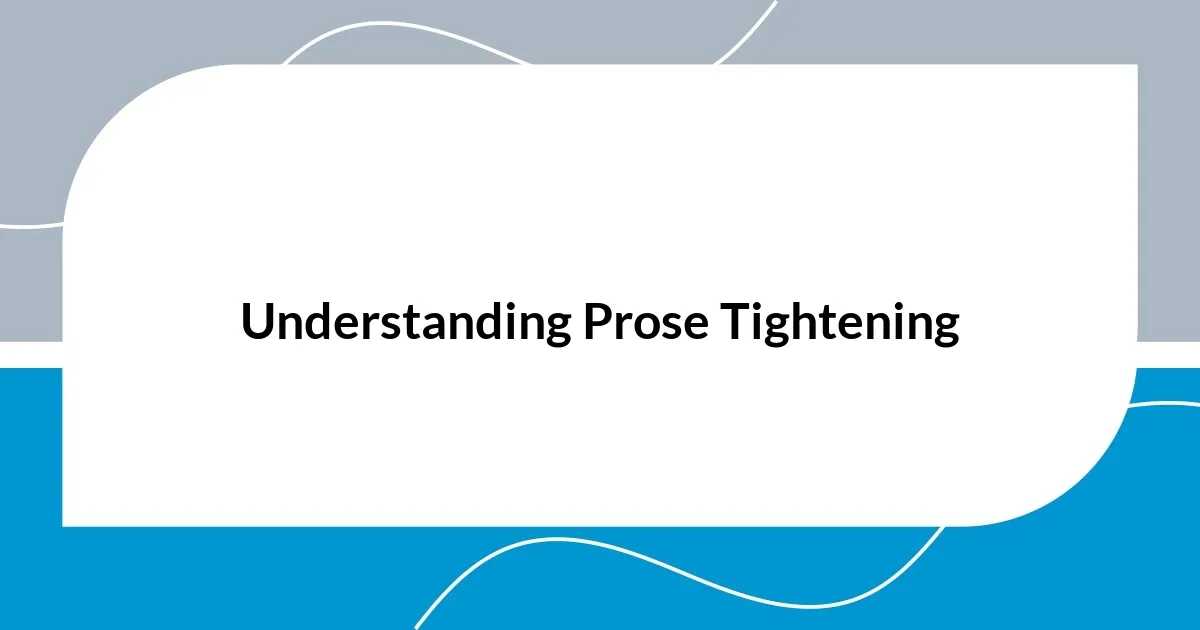
Understanding Prose Tightening
Tightening prose is all about clarity and impact. I remember when I first realized that trimming unnecessary words transformed my writing. Each time I cut a superfluous adverb or redundant phrase, I felt more liberated—that’s the power of precision!
Have you ever noticed how lengthy sentences can sometimes obscure your message? I certainly have. Early in my writing journey, I often found myself buried in elaborate descriptions. When I began focusing on brevity, I discovered that simple sentences could evoke just as much emotion, if not more. It’s like unraveling a tangled ball of yarn; simplifying my prose let the core idea shine through.
The act of tightening prose isn’t merely a technical exercise; it’s an emotional journey toward authenticity. I often ask myself, “What truly matters in this piece?” By honing in on crucial themes, my writing becomes more engaging and resonates deeper with readers. It’s about stripping away the fluff to reveal the essence of what I want to convey.
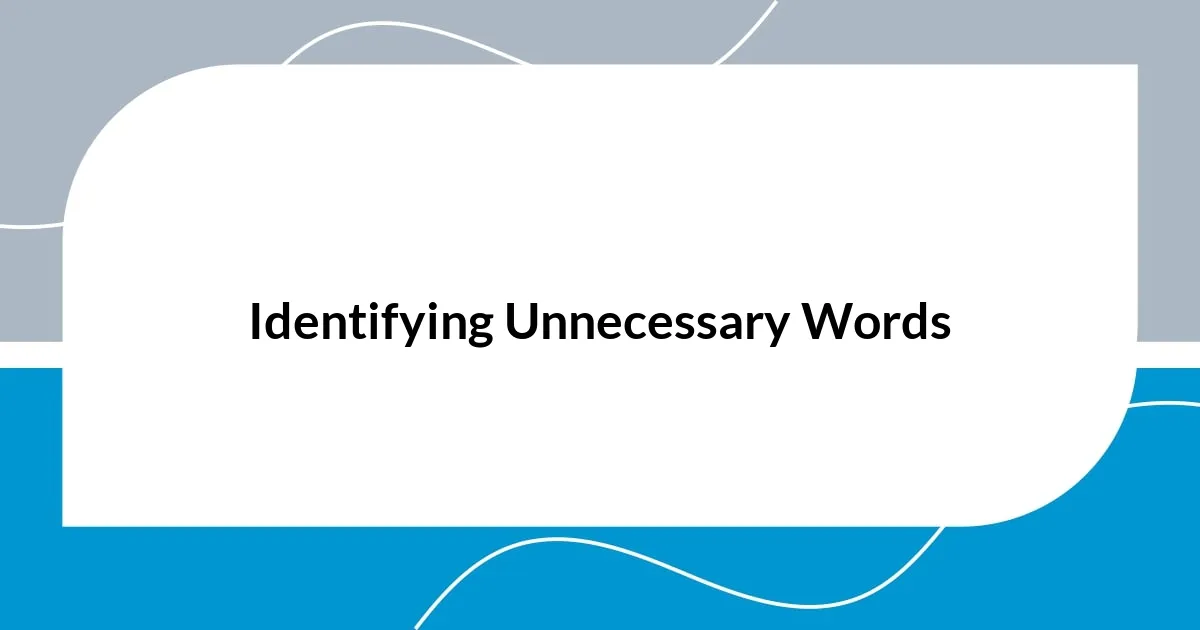
Identifying Unnecessary Words
I’ve learned that unnecessary words often sneak into my writing without me even realizing it. When I first draft an article, I might use phrases like “in order to” instead of simply saying “to.” This realization hit me hard during a workshop where a mentor pointed out that every filler word dilutes my message. From that day onward, my editing process became a scavenger hunt—searching for and eliminating those sneaky redundancies to sharpen my prose.
There’s a certain thrill I experience when I catch an adjective that doesn’t add value. For instance, when I spotted “very unique” lurking in my text, I knew it had to go; “unique” stands strong on its own. It’s these little victories that keep me going—realizing how a few changes can enhance the clarity and overall impact of my piece. Can you remember a time when you trimmed down your writing and felt a wave of clarity wash over you? I still cherish those moments.
To make this actionable, I’ve developed a simple checklist for identifying unnecessary words. Whenever I edit, I ask myself: Is this word essential? Does it enhance my message or just fill space? This habit transformed my approach to writing. It reminds me that less can often be more, allowing the key ideas to shine brightly.
| Original Phrase | Tightened Phrase |
|---|---|
| In order to complete | To complete |
| Very unique | Unique |
| At this point in time | Now |
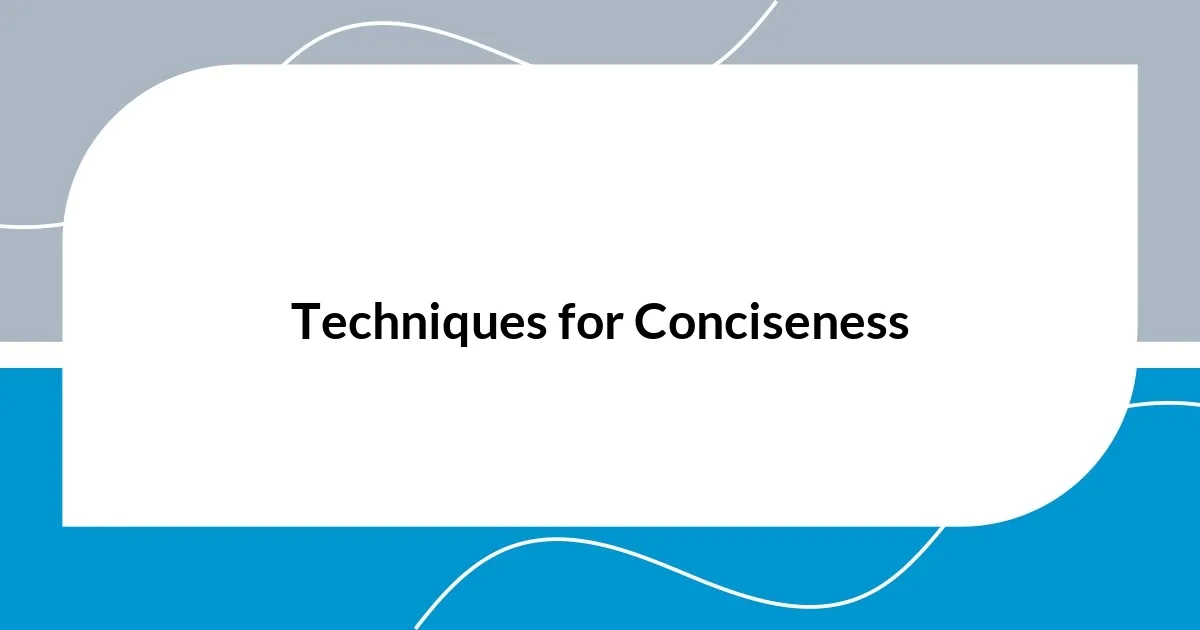
Techniques for Conciseness
I vividly remember my early days of writing when I stuffed my sentences with adjectives and unnecessary qualifiers, thinking that they added sophistication. One particular instance stands out: I was writing an article about the beauty of nature and ended up with convoluted sentences that left readers confused rather than intrigued. It took a heartfelt conversation with a fellow writer to realize that concise language could reveal the majesty of the scenery much more effectively. This epiphany led me to embrace techniques for conciseness that I now consider essential for any writer striving for clarity.
Here are some techniques I’ve found helpful:
- Eliminate redundant modifiers: Words like “absolutely essential” can simply become “essential.”
- Use active voice: It usually requires fewer words and delivers a more impactful statement.
- Prefer strong verbs over adverbs: Instead of “ran quickly,” use “sprinted” for a sharper, stronger image.
- Break up long sentences: A complex sentence can often be split into two simpler ones for better understanding.
- Practice the art of the one-sentence paragraph: Sometimes, a single, powerful statement stands out more than convoluted attempts to elaborate.
I encourage you to reflect on your own writing habits. Can you recall moments when removing just a few words shifted the entire tone of your piece? I often find that clarity not only enhances the writing but also connects me more deeply with the message I’m trying to communicate.
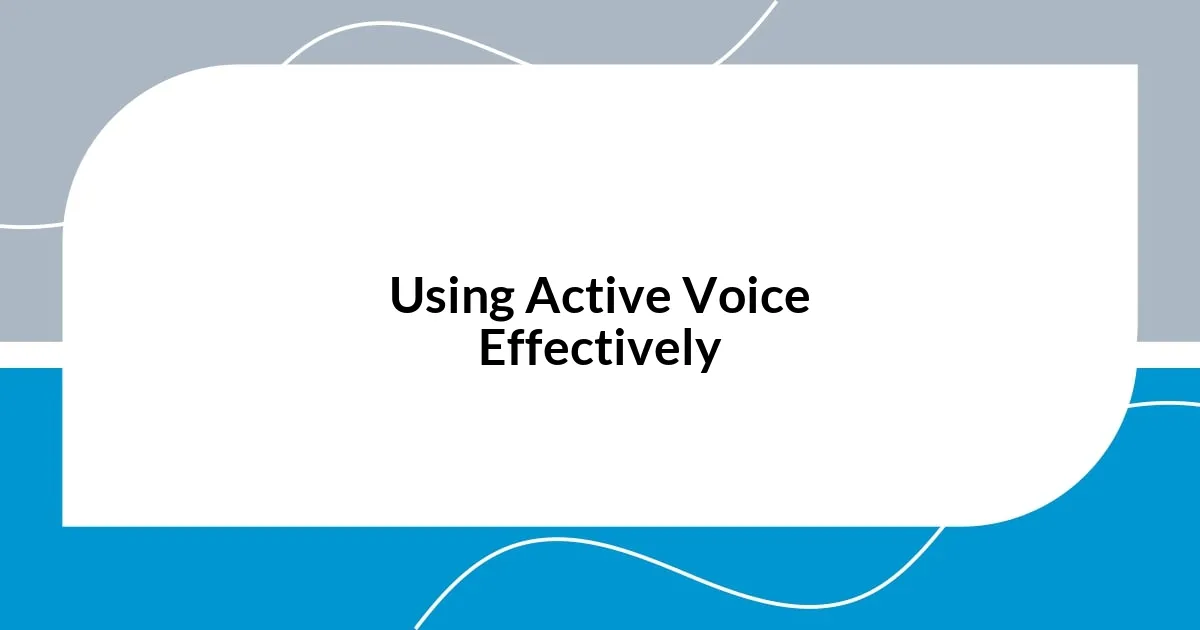
Using Active Voice Effectively
When I first grasped the power of active voice, it felt like I had uncovered a hidden gem in my writing toolbox. Rather than relying on constructions like “The book was read by me,” I began embracing phrases such as “I read the book.” This small shift not only tightened my prose but also invigorated my writing, giving it a dynamic and engaging quality that keeps readers hooked. Can you recall a moment when you switched to active voice and felt the difference immediately? I remember feeling lighter, as if my writing could breathe.
I’ve often noticed that sentences written in the passive voice can create a distance between the writer and the reader. During one of my editing sessions, I stumbled upon a sentence that read, “Mistakes were made.” It felt flat and unengaging. Transforming it into “I made mistakes” brought a wave of honesty and connection. It’s as if I was inviting my readers into my experience, sharing my humanity rather than hiding behind vague statements. This change made me realize how active voice fosters accountability and clarity.
By actively shaping my sentences, I discovered that my writing resonated more deeply with my readers. When I write “The team delivered the project,” it’s direct and impactful, rather than diluting the message with abstractions. Have you tried this in your writing? I challenge you to rewrite a few passive sentences you’ve penned and notice how they spring to life. Engaging with active voice not only energizes my prose but also kindles a stronger bond with my audience, ultimately enhancing the overall effectiveness of my message.
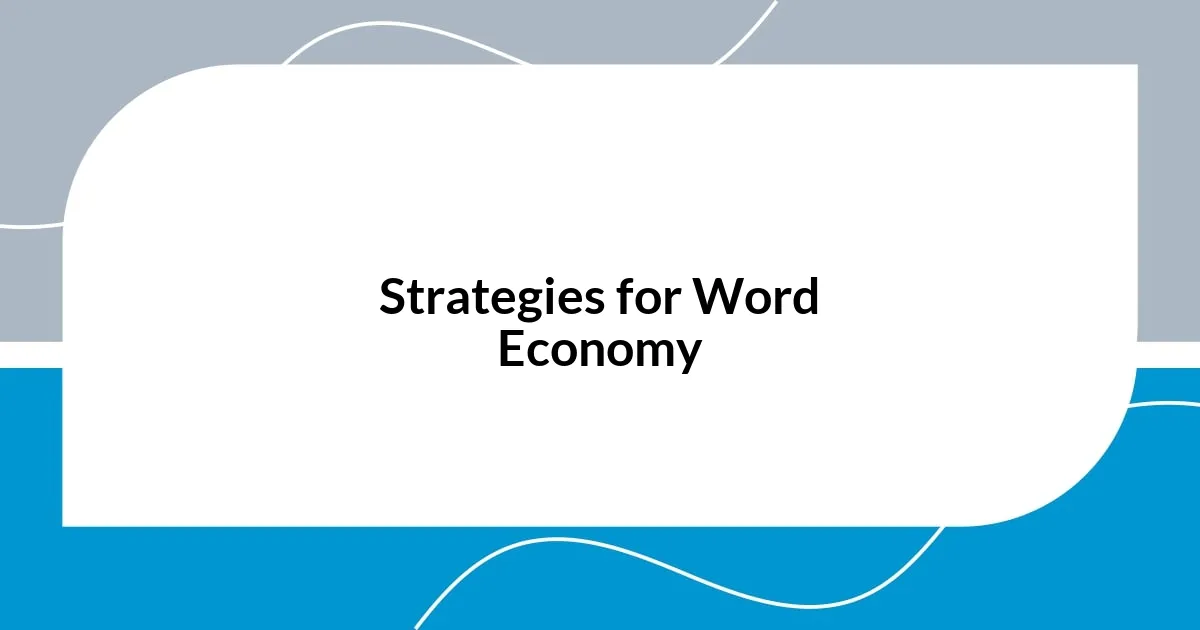
Strategies for Word Economy
One strategy I’ve found particularly effective is to cut redundant modifiers from my writing. I remember a time I wrote about a “very unique experience.” Taking a moment to reflect, I realized that “unique” already implied something extraordinary—no need for “very.” Since then, I’ve made it a habit to scrutinize my sentences, seeking out those unnecessary additions that dilute meaning. Have you ever caught yourself doing the same? It’s amazing how clarity emerges when we eliminate excess.
Another technique that transformed my writing was embracing strong verbs in place of adverbs. Early on, I’d often say someone “walked slowly,” but I later discovered the richness of the word “strolled.” This not only tightened the sentence but also painted a clearer picture in the reader’s mind. I still recall the rush of excitement I felt when a writing mentor pointed this out to me—suddenly, my prose felt more vibrant and engaging. Isn’t it invigorating to see how one word can carry so much weight?
One final tip I’d like to share is the power of breaking up long sentences. When I finally learned to dissect my longer thoughts into bite-sized pieces, the flow became natural and more digestible. There was a time I wrote a paragraph that resembled a marathon run; I was exhausted just reading it! After breaking it down, I could feel the airiness in my writing. Have you experienced the relief of clarity after simplifying? It’s nothing short of liberating—exciting, even—when you realize that your readers can follow your ideas effortlessly.
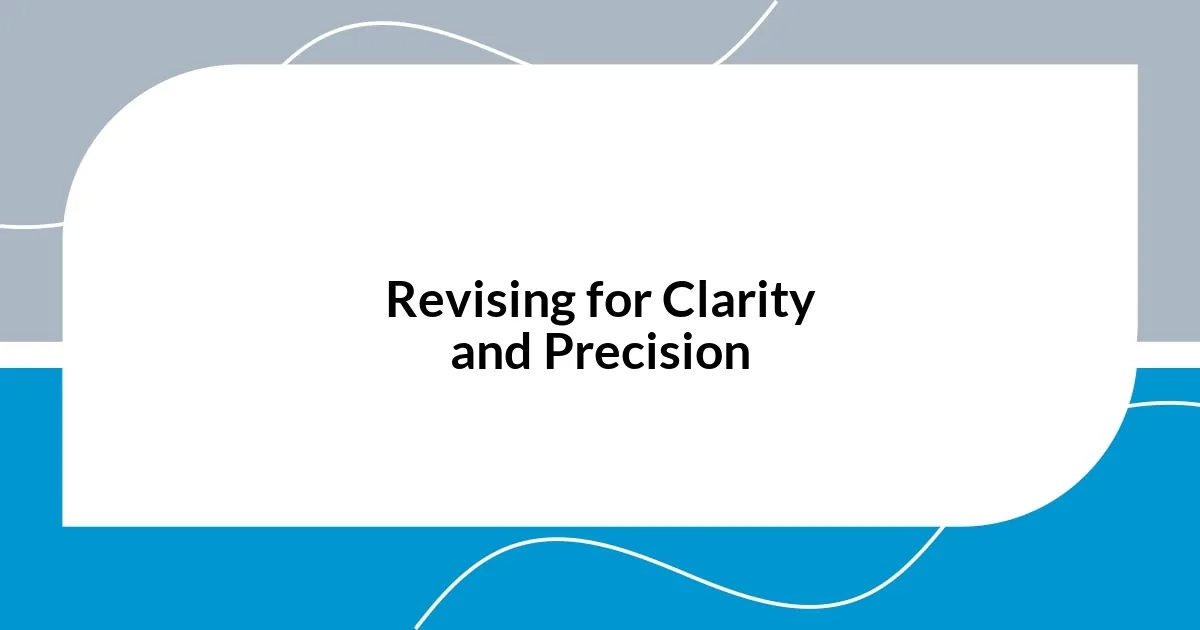
Revising for Clarity and Precision
Revising for clarity often starts with taking a fresh look at my sentences. I remember one instance where I had written, “The reason for the delay was due to unforeseen circumstances.” A quick revision turned this into “The delay was due to unexpected issues.” Not only did I cut unnecessary words, but I also made the sentence more straightforward. It’s a revelation to see how rephrasing can clarify your intent. Have you felt that rush when a complex thought crystallizes into a simple statement?
I’ve also found that reading my work aloud can unveil clarity gaps I hadn’t seen on the page. There was a moment when I stumbled over my own words, which revealed overly intricate sentences and convoluted ideas. By verbally processing my writing, I learned where to trim the fat and make my arguments shine. This approach reminds me of having a conversation—when something sounds off, it invites me to rethink my perspective. Has there been a time you caught something unexpected in your writing just by hearing it?
Lastly, I’ve started questioning every word I choose. I remember grappling with a sentence where I used “in the event that.” It felt like the sentence was trying too hard to be formal. I changed it to simply “if,” and suddenly it felt more approachable and direct. This ongoing practice not only ensures my writing stays concise but also makes my thoughts feel more accessible. How often do you pause to examine whether your words are serving clarity or complicating the message? Trust me; it’s a game-changer when you start prioritizing straightforwardness in your writing.
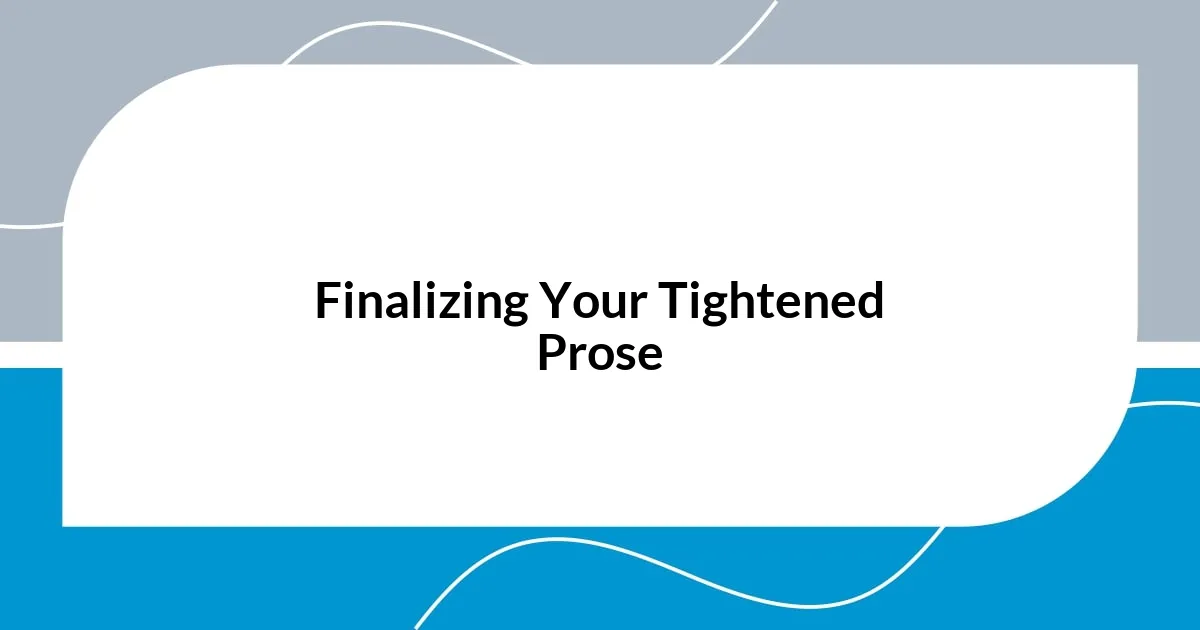
Finalizing Your Tightened Prose
Finalizing my tightened prose often involves a purposeful read-through, where I challenge myself to spot any lingering fluff. Just the other day, I found a phrase that read, “It’s important to note that,” and I couldn’t help but roll my eyes at how unnecessary it was. I replaced it with a simple “Note that,” and that small shift made the sentence punchier and more to the point. Have you ever felt that sense of relief when something overly wordy suddenly transforms into a crisp statement?
Another step I take in finalizing my work is to seek feedback from trusted peers. I remember sharing a draft with a colleague who pointed out several areas where my sentences felt awkward or unclear. At first, I was defensive—I thought my writing flowed well! But after taking a step back, I recognized their perspective gave me valuable insights. That moment reminded me that collaboration isn’t just about receiving criticism; it’s about refining my craft through others’ eyes. Have you ever had an epiphany sparked by someone else’s comment?
I also love to take a break before the final read-through—it’s like letting my thoughts settle. Once, I banged out a piece late at night, brimming with pride. However, after sleeping on it, I returned to find a few phrases that didn’t quite resonate. Revising with fresh eyes illuminated awkward transitions I hadn’t noticed before. It’s interesting how distance can grant clarity. Isn’t it fascinating how our perceptions shift when we distance ourselves from our writing for just a bit?